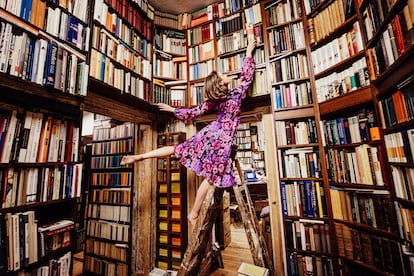If you go home with somebody, and they don’t have books, don’t sleep with them
Books create a sense of home, and when they are missing or disorganized, it can leave us feeling disoriented

They say that to truly understand someone, you should take a peek at their library. Although rifling through their trash might also shed some light, I can assure you that’s not the case for me. However, the other day, upon returning home, I was greeted by a sight of utter chaos in my once orderly sanctuary of books. The familiar rhythm of colors and shapes had been disrupted, leaving me feeling disoriented and lost. The disarray had transformed my cherished collection into something unrecognizable, almost as if I was a stranger to myself.
The painters had been working all week. The 2,000 books in the built-in bookshelf along the hallway had been temporarily moved to paint it. But then they put the books back somewhat haphazardly, and it looked like a tornado had blown through the house. Liliana (was she still Liliana?) seemed pleased with the new look of the apartment. But I wasn’t sure whose home it was or who I was. And whose books were they anyway?
Every book collection reflects its owner’s personality. A unique mix of gothic novels, engineering manuals, romantic poetry and cookbooks are like strands of DNA. Just as people change, book collections also evolve. The books in my messy teenage bedroom were different from the ones in the shared apartment of my adventurous youth and the ones in my cozy home as a new father. Letting go of the old and welcoming in the new is a skill you must master if you want to collect books without turning into a hoarder. A book collection evolves, just like we do.
Saying goodbye to books is not an easy task. In his story about how he got rid of 500 books, Augusto Monterroso explores the challenges of parting with tomes that occupy shelf space but often go untouched. Someone once said that an ideal home library consists of exactly 300 books, and every new arrival must replace an outgoing one. However, we tend to hold onto books for various reasons, even if they mainly serve as decorations. These reasons vary from emotional attachment to the self-promises of future reading that are often illusory.
Having a home library brings great joy, not just from reading books, but also from arranging and appreciating them. The sight of a book spine can pique your curiosity and ignite ideas in your mind. And of course, showing them off to visitors is a must. Iconoclastic filmmaker John Waters once said, “If you go home with somebody, and they don’t have books, don’t fuck ‘em!” He thus suggested a profound correlation between the bookshelf and the essence of a person.
During such visits (whether or not there is any sex), many people will inquire about our reading habits, as if that were the sole purpose of a home library. Some may even attempt to borrow a book with no intention of returning it. In such cases, we must be firm in our refusal, unless there is a genuine overpopulation of books. Some people would rather read than eat, and others have literally lost their heads over a book. A few are so consumed by their love for books that they need eight homes to accommodate their collections, while others have perished in house fires trying to save their collections.
The contents of a home library are important, but so is they way it’s organized. After all, that’s what we see when we peruse the shelves. After the painters left, I found myself in a dilemma. I could organize my collection the same way as before, or perhaps emphasize the poetry books (we poetry readers are few, but we’re the best). But I thought it would require too much intellectual paleontology and a longing for a throwback, more poetic version of myself.
I could organize the books based on recent interests, reserving the star shelves for essays on current affairs (nonfiction aligning with the zeitgeist of today) and contemporary novels that blend genres or explore transgender themes. As I surveyed my cluttered collection, the scent of fresh paint lingering in my nostrils, a sense of unease washed over me. Could the relationship between a person and their books be bidirectional? Would organizing my books in a certain way shape my future personality, rather than reflecting my current one?
My hands trembled, and as if pushed by some unseen force, a book plummeted from a shelf to the floor.
Sign up for our weekly newsletter to get more English-language news coverage from EL PAÍS USA Edition
Tu suscripción se está usando en otro dispositivo
¿Quieres añadir otro usuario a tu suscripción?
Si continúas leyendo en este dispositivo, no se podrá leer en el otro.
FlechaTu suscripción se está usando en otro dispositivo y solo puedes acceder a EL PAÍS desde un dispositivo a la vez.
Si quieres compartir tu cuenta, cambia tu suscripción a la modalidad Premium, así podrás añadir otro usuario. Cada uno accederá con su propia cuenta de email, lo que os permitirá personalizar vuestra experiencia en EL PAÍS.
¿Tienes una suscripción de empresa? Accede aquí para contratar más cuentas.
En el caso de no saber quién está usando tu cuenta, te recomendamos cambiar tu contraseña aquí.
Si decides continuar compartiendo tu cuenta, este mensaje se mostrará en tu dispositivo y en el de la otra persona que está usando tu cuenta de forma indefinida, afectando a tu experiencia de lectura. Puedes consultar aquí los términos y condiciones de la suscripción digital.









































